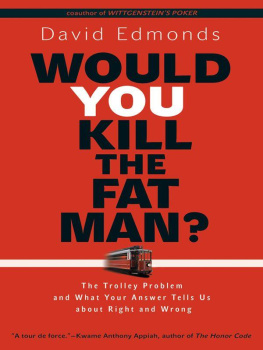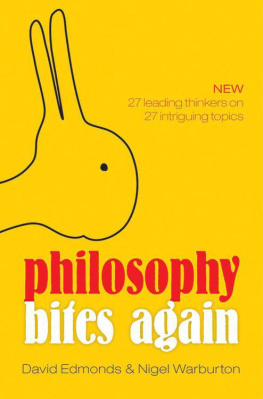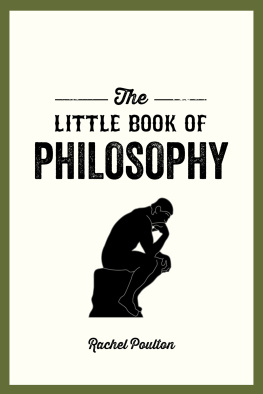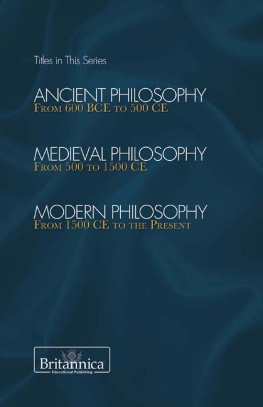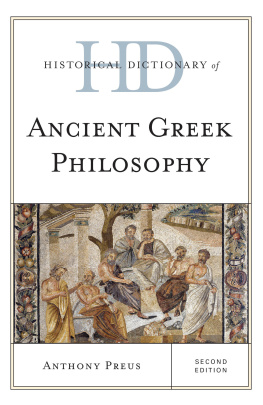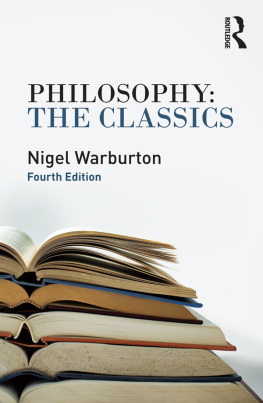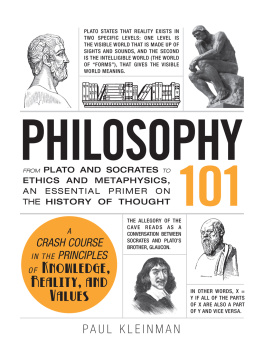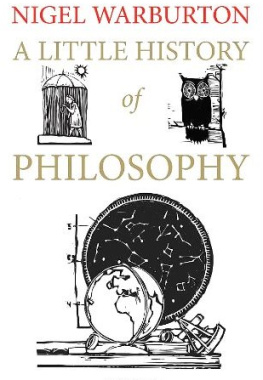PHILOSOPHY BITES BACK

PHILOSOPHY BITES BACK
DAVID EDMONDS &
NIGEL WARBURTON



Great Clarendon Street, Oxford, OX2 6DP,
United Kingdom
Oxford University Press is a department of the University of Oxford.
It furthers the Universitys objective of excellence in research, scholarship,
and education by publishing worldwide. Oxford is a registered trade mark of
Oxford University Press in the UK and in certain other countries
David Edmonds and Nigel Warburton 2012
The moral rights of the authors have been asserted
First Edition published in 2012
Impression: 1
All rights reserved. No part of this publication may be reproduced, stored in
a retrieval system, or transmitted, in any form or by any means, without the
prior permission in writing of Oxford University Press, or as expressly permitted
by law, by licence, or under terms agreed with the appropriate reprographics
rights organization. Enquiries concerning reproduction outside the scope of the
above should be sent to the Rights Department, Oxford University Press, at the
address above
You must not circulate this work in any other form
and you must impose this same condition on any acquirer
British Library Cataloguing in Publication Data
Data available
Library of Congress Cataloging in Publication Data
Data available
ISBN 9780199693009
Printed in Great Britain by
Clays Ltd, St Ives plc
Links to third party websites are provided by Oxford in good faith and
for information only. Oxford disclaims any responsibility for the materials
contained in any third party website referenced in this work.
To Saul, Joshua, and Hannah
CONTENTS
INTRODUCTION
Who is the most important philosopher in history? Every now and again philosophers are asked about this in silly but enjoyable polls. A few names routinely crop up; no roll call could exclude Plato, Aristotle, Descartes, Hume, Kant, or Marx. But the philosophical canon is not fixed: it is a contested list, subject to argument and, occasionally, bitter disagreement. There was an outcry in Cambridge University in 1992, when the university authorities proposed to award the French thinker Jacques Derrida an honorary doctorate.
The following interviews are not meant to provide comprehensive coverage of the canon. There are notable philosophers whom you wont read about here, as well as some who arent normally included on any core curriculum. Think of this list as more like an intellectual tasting-menu, an offering of morsels, packed, we hope, with philosophical nutrition. The contributors have made some suggestions for further reading which are included at the end of the book.
Philosophy now has over two and a half millennia of ideas from which to draw. Each generation rereads and reinterprets the significant figures from the past. We are fortunate to have spoken to some of todays leading exponents about some of yesteryears most important thinkers.
The interviews began in oral form for Philosophy Bites ( www.philosophybites.com ), a popular podcast which as this book goes to print has had over 15 million downloads. When Philosophy Bites began, sceptics claimed there would be minimal interest in what they regarded as its esoteric material. But from all around the world, people have listened in to hear about Platos views on love, Kants synthetic a priori propositions, or Sartres existentialism.
We are extremely grateful to the philosophers weve interviewed over the years: weve now had the privilege of hundreds of hours of free tutorials with some very clever and interesting people. Were especially thankful to those philosophers who appear in the book and whove granted permission for the interviews to be used in written form. All the interviews have been adapted so that they work as well as possible for the page. Wed like to thank our wives Anna and Liz, our agents, Caroline Dawnay and Veronique Baxter, and two institutions, London Universitys Institute of Philosophy and Oxford Universitys Uehiro Centre for Practical Ethics. The Institute of Philosophy has helped fund us, and provided us with a room in central London in which to conduct many of the interviews. Barry Smith and Shahrar Ali have provided constant encouragement, tips for interviewees, and the occasional glass of rather fine wine. Weve also conducted several interviews at Oxfords Uehiro Centre for Practical Ethics and are grateful to the Centres dynamic Director, Julian Savulescu, and also to the Centres administrators, Miriam Wood and Deborah Sheehan.
Finally, thanks to our regular (unpaid) proofreader, Hannah Edmonds, to OUPs proofreader Javier Kalhat, and to our editors at OUP, Peter Momtchiloff, who commissioned this and our earlier Philosophy Bites book, and Eleanor Collins who saw it through production.
We dedicate this book to our children: Saul, Joshua, and Hannah.
David Edmonds and Nigel Warburton, April 2012
www.philosophybites.com
WHO IS YOUR FAVOURITE PHILOSOPHER?
For the past couple of years weve been asking the philosophers weve met a simple question, for which they were given no warningwho is their favourite philosopher and why? The eighteenth-century Scot, David Hume, came out first. That was no great surprise, though the extent of his lead was: he was the choice of more than 20 per cent of our sample. The other major philosophers always cited in the canon, Plato, Aristotle, Descartes, Kant, Mill, Nietzsche, Wittgenstein, were all well represented, but far behind.
Sarah Bakewell: Id have to go for two: Michel de Montaigne, who wrote essays about his life with a philosophical turn, because he is so much an ordinary human being; and also Friedrich Nietzsche because he also came at philosophy from completely unexpected angles. Like Montaigne, Nietzsche always looked for the underlying, unexpected angle to everything he wrote about.
Helen Beebee: My favourite philosopher is David Hume. His writings, particularly A Treatise of Human Nature, are a phenomenal intellectual achievement, and incredibly ahead of their time. He asked questions that others hadnt thought to ask. He challenged the orthodoxy when it came to religion and causation. I believe some of the things that Hume believed, but thats a side issueI think a lot of philosophers have Hume as their favourite philosopher even if they dont really agree with what he says.
Nick Bostrom: Thats putting me on the spot. Im not sure I have one favourite philosopher. Contemporary philosophy, at least the way Im doing it, is more like science in that many people have made significant contributions and youre not so much following in the footsteps of one great individual but youre more drawing on the heritage of many people working over a long time.
Luc Bovens: I very much enjoy reading Aristotle. When you read Aristotle, every letter, every word feels important. You have the feeling that he was writing in parchment. Every time I read Aristotle I see new things. At the London School of Economics we have an interest in philosophy being continuous with the sciencesthis may be a controversial claimand when youre reading Aristotle sometimes what you see is a proto-economist at work. You see a continuity between the style of argumentation that is used in philosophy and the style of argumentation used in the sciences. And deep down there is no distinction: thats what I find is so wonderful in Aristotle.
Next page

